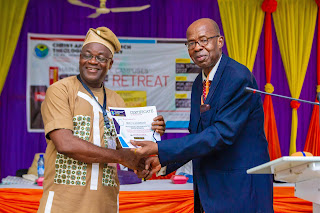 |
| Professor Jacob Kehinde Ayantayo |
By Boluwatife Oparinde
A Professor of Religious Ethics, Religion and Society, and Religious Peace and Conflict Studies, Professor Jacob Kehinde Ayantayo, has declared that for theological education to be profitable in today’s society, there is a need to review the existing curriculum for possible collaboration with science and technology.
Speaking on the topic, “Creativity and Systemic Networking among Drivers of Theological Education;” Prof. Ayantayo made the call at the ongoing 2022 Staff Retreat of Christ Apostolic Church Theological Seminary on Monday May 16, 2022 at the Main Campus, Opa, Ile Ife, Osun State while delivering the Keynote Address.
According to him, “Religion permeates into all departments of life so fully that it is not easy or possible always to isolate it. Relating this thesis to theological education implies reviewing and redesigning their curriculum in such a manner that will enhance possible collaboration between theological courses and cognate aspects of Science and Technology.”
He suggested courses such as Theology and Botany, Theology and Ethnobotany, Theology and Chemistry, Chemistry of Theology and Water/Anointing Oil, Digitalisation of Theology and Resources, Computation of Religious Information, Religions in Geographical Elements, Religion and the Environment, Geography of Religions' Spread, Theology and factor in Disaster Risk Management, Mystical background Geology, Theology and Ethos for Applied Geology, Theology and Numbers/Numerology, Theology of Food Storage, Theology and Mechanical and Industrial Tools, Theology and Wood Technology, Theology and Electrical System; and so on.
Prof. Ayantayo, a former Head of Department, Religious Studies, University of Ibadan; identifying the meeting point between religion, science and technology explained that, “religion emphasizes value as far as human beings and the society they live is concerned. On human beings, religion places a high premium on the sacredness of life and its dignity as exemplified in religious moral codes. It does not stop there; it also shows concern for the environment. Particularly, care for the environment and everything therein, even though man has dominion over the environment but with a caveat stewardship.”
“The advancement, innovation and progress brought about by science and technology are always subject to review within the ambit of religious values and judgment in the long run. Regarding whether the innovation is negative or positive depends on its compliance or deviation from religious standards/values. For instance, the one that sustains life and advances human dignity like life-saving machines, ultrasound machine for pregnant women, and oxygen machine are judged as positive scientific and technological innovations while those that lead to termination of life such as atomic bomb, nuclear weapon, machine gun to mention a few are judged to be negative scientific and technological innovations,” he said.
Prof. Ayantayo who explained that, meeting the philosophy of theological education led to the emergence of many drivers in terms of its administration, organogram, functions, relationship, finance, mission, and modus operandi generally; also suggested that that the existing drivers, such as, Vision and Philosophy, Finance, Social Change, Resource Persons, and Students' body, are no longer sufficient, which is suggestive of the urgent need to seek more essentially from the perspective or angle of creativity and systemic networking.
The Professor of Religious Ethics, who is also the founding President, African Society for the Study of Sociology and Ethics of Religions (ASSOSER) stated that, “there are so many areas in the life of theological education where creativity and systemic networking are needed urgently" and he explored only the sides of the administrators and lecturers, the students and the local contents of the curriculum of a theological institution.
Ayantayo concluded that, “theological institutions cannot continue to do one thing the same way and expect different and outstanding results. Theological educators need more than prayers and fasting to grow their institutions; they need networking, creativity and innovation. They need help. They need to be humble enough to ask for help. They need collaboration. They need education. Nobody can claim to be ‘Mr. Know all’. They need to exchange ideas, they need to be sociable and interactive. The time to do so is now.”


Pro you say the truth, sir but CAC seminary don't have the standard and most of the lecturer in our seminary if will should put it on standard most of them are not qualified to teach their. I have a prevailing to follow my lecturer who is a Catholic priest to Catholic seminary and I unserved that all the lecturer who is teaching in that seminary have a PhD in different field of study in different university in different countries. Most of the lecturer who is teaching in our seminary they only finished seminary and this can not begins good result. We have to developed ourselves both physical and spiritual.
ReplyDelete